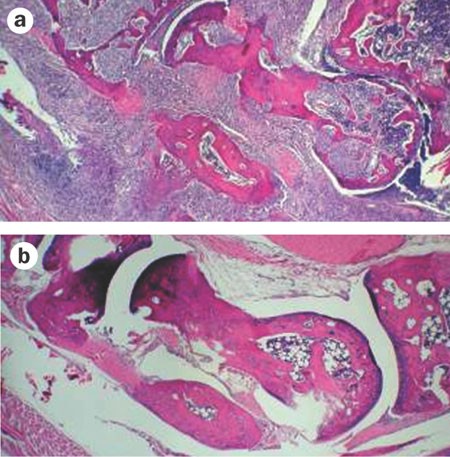
- Select a language for the TTS:
- UK English Female
- UK English Male
- US English Female
- US English Male
- Australian Female
- Australian Male
- Language selected: (auto detect) - EN
Play all audios:
Muchamuel, T. _ et al_. A selective Inhibitor of the immunoproteasome subunit LMP7 blocks cytokine production and attenuates progression of experimental arthritis. _Nat. Med._ 15, 781–787
(2009). The ubiquitin–proteasome system regulates cytokine production, but can its immunoproteasome counterpart in lymphocytes and monocytes similarly affect the cytokine output of both cell
types? According to studies by Muchamuel and colleagues, it can; moreover, targeting one of its catalytic subunits, LMP7, halts the progression of experimental arthritis. The researchers
were following up on previous results revealing a novel function for all immunoproteasome subunits in the survival and expansion of T cells in a proinflammatory environment, with the lead
investigator, Marcus Groettrup, hypothesizing that “...inhibition of active site subunits of the immunoproteasome could be a useful approach to dampen undesired T-cell responses.” Muchamuel
_ et al_. began by showing that the LMP7-selective inhibitor PR-957 could abrogate the presentation of an endogenously expressed LMP7-dependent epitope. Proteasome inhibitors that target
both β5 (a subunit of the constitutive 26S proteasome) and LMP7 subunits block cytokine production in stimulated monocytes. By using PR-957, the researchers showed that LMP7 activity was
required to produce proinflammatory cytokines, such as tumor necrosis factor (TNF), interferon γ, interleukin (IL)-6 and IL-23; selectively inhibiting β5 had no substantial effect on
cytokine release—immunoproteasome inhibition was probably responsible for mediating the effects on cytokines of the broad-spectrum inhibitors. Selectively targeting LMP7 in cells from
patients with rheumatoid arthritis (RA) also blocked the production of TNF, IL-6 and IL-23. Inhibiting LMP7 also interfered with the differentiation of T-helper-17 cells _in vitro_, implying
a role for this subunit in T-cell differentiation into inflammatory effector cells. PR-957 suppressed symptoms in two independent mouse models of RA: it showed greater efficacy than
etanercept in an aggressive model of collagen-induced arthritis (Figure 1), and a more rapid response in collagen antibody-induced arthritis, possibly by affecting several cell types and
cytokines. “...Discovering how the immunoproteasome influences cytokine production will be a major challenge,” concludes Groettrup. Authors * Katrin Legg View author publications You can
also search for this author inPubMed Google Scholar RIGHTS AND PERMISSIONS Reprints and permissions ABOUT THIS ARTICLE CITE THIS ARTICLE Legg, K. The immunoproteasome as an anti-inflammatory
target?. _Nat Rev Rheumatol_ 5, 469 (2009). https://doi.org/10.1038/nrrheum.2009.155 Download citation * Issue Date: September 2009 * DOI: https://doi.org/10.1038/nrrheum.2009.155 SHARE
THIS ARTICLE Anyone you share the following link with will be able to read this content: Get shareable link Sorry, a shareable link is not currently available for this article. Copy to
clipboard Provided by the Springer Nature SharedIt content-sharing initiative







